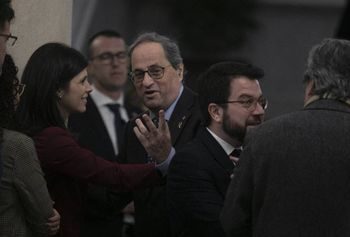

The British justice system has finally agreed to let a Spanish judge question WikiLeaks founder Julian Assange as a witness in a case involving allegations that a Spanish security firm spied on him while he was living in the Ecuadorian embassy in London.
Judge José de la Mata of Spain’s High Court, the Audiencia Nacional, will interview the cyber-activist via video link on December 20, said judicial sources.
Judge José de la Mata will question Assange on December 20
Assange will be transferred from Belmarsh prison in southeast London to Westminster Magistrates Court to answer questions from De la Mata, who is investigating alleged violations of client-attorney privilege between the cyber-activist and his lawyers, and allegations that these conversations were passed on to the CIA.
British civil servants visited Assange in prison last week, asked him whether he agreed to be questioned by De la Mata, and delivered a document listing the events under investigation by the judge, who had issued a European Investigation Order (EIO) in September requesting assistance from British authorities.
This list of events under investigation, which EL PAÍS has seen, notes that David Morales, owner of the Spanish security firm UC Global, SL “invaded the privacy of Assange and his lawyers by placing microphones inside the Ecuadorian embassy in London without consent from the affected parties.” It also states that the information thus collected was distributed to other people and institutions, including “authorities from Ecuador and agents from the United States.”
It has not been easy to secure the UK’s permission to question the Australian cyber-activist
It has not been easy to secure the UK’s permission to question the Australian cyber-activist. The Spanish judge sent London the EIO on September 25, requesting authorization to interview Assange as part of an investigation into Morales and his company for breach of privacy, violation of client-attorney privilege and illegal arms possession.
Documents and video footage revealed in July by EL PAÍS show that UC Global, SL spied on Assange’s conversations with his lawyers at meetings where they were designing his defense strategy to avoid extradition to the US. Morales allegedly delivered these and other conversations to US intelligence services.
The British justice system, acting through the United Kingdom Central Authority (UKCA), the agency in charge of processing EIOs, initially blocked De la Mata’s request. This body questioned the Spanish judge’s powers to investigate the case in the UK, and demanded more “clarity” and information than the judge had provided.
This position created unease in judicial circles, and was viewed as resistance to an investigation that could hinder Assange’s extradition to the US. The WikiLeaks founder’s hearing is scheduled for February.
Several Spanish judges consulted by this newspaper said that EIO requests are generally granted on an automatic basis. With an EIO, a legal authority from a EU member state can ask a legal authority from another EU country for assistance in obtaining evidence or means of evidence, including witness statements.
The US justice system is accusing Assange of 18 crimes that add up to 175 years in prison in connection with WikiLeaks’ publication of classified material on military operations in Iraq and Afghanistan.
English version by Susana Urra.
Get real time update about this post categories directly on your device, subscribe now.





















